By Andrew Hensel | The Center Square
A group’s challenge of Chicago’s ordinance imposing fees after a vehicle impoundment is now under consideration by the Illinois Supreme Court.
The case was filed in 2017 on behalf of vehicle owners who either paid administrative penalties or had judgments entered against them for such penalties under Chicago’s impoundment ordinance. The four plaintiffs in the case had penalties imposed ranging from $1,000 to $4,000. Two of the plaintiffs were driving their own vehicle when they were arrested. The other two, children, were driving plaintiffs’ vehicles when they were arrested.
Chicago enacted the impoundment ordinance in 1998, which allows the city to impound vehicles under certain circumstances and impose administrative penalties based on the circumstances of the impoundment.
Attorney Charles Morrissey argued before the Illinois Supreme Court on behalf of the plaintiffs and explained their stance.
“This case is a matter of great public concern,” Morrissey said. “The city of Chicago has been imposing penalties that are in conflict with section 11-2.7 of the motor vehicle code.”
The state’s vehicle code reads that “no local authority shall enact or enforce any ordinance rule or regulation in conflict with the provisions of this Chapter unless expressly authorized herein.”
Lower courts affirmed Chicago’s position.
Chicago Assistant Corporation Counsel Steven Collins argued the fees act as a deterrent to violence.
“Vehicle regulation plainly does pertain to local government and affairs,” Collins argued in front of the Illinois Supreme Court earlier this month. “Section 6A of the constitution expressly provides that home rule authority includes the power to regulate for the protection of public health and safety of its residents.”
Collins said that because the plaintiffs’ vehicles were impounded due to a public safety violation, the city could impose fees.
“Here, the city’s administrative penalties associated with impoundment do just that by providing deterrents against vehicle offenses that would otherwise put into risk the health and safety of Chicago residents,” Collins said.
Morrissey said the power given to police to enforce these rules are unconstitutional.
“It is our position that the reference to police regulations is a reference to their power that the legislature has granted them to pass laws not inconsistent as it says in that express limitation,” Morrisey said.
Chicago ordinance states that if the administrative law judge finds the owner of the vehicle liable, the vehicle will not be released until the owner pays the fine plus the costs of towing and storage.
If the vehicle is also subject to booting for unpaid parking tickets and/or compliance violations, the vehicle’s owner must also pay the amounts due for all such outstanding violations prior to the release of the vehicle, the city says on its website.
The supreme court took the case under advisement.
This article originally appeared on The Center Square.






